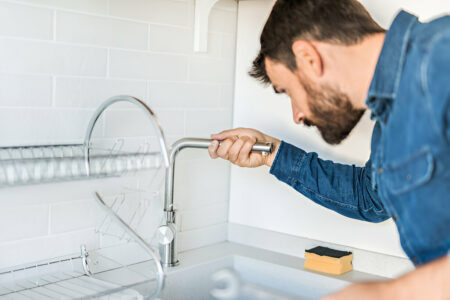A blocked kitchen drain can be a major inconvenience, disrupting your daily routine and potentially leading to unpleasant odors and standing water. Knowing how to unblock a kitchen drain effectively can save you time and money. This article will guide you through various methods to clear your drain and prevent future blockages.
Signs That Your Kitchen Drain is Blocked
Slow Draining Water
One of the first signs of a blocked kitchen drain is slow-draining water. If you notice that water takes longer than usual to drain, it is likely due to a blockage.
Unpleasant Odors
A blocked drain often emits foul smells. These odors are caused by trapped debris and stagnant water, indicating that it’s time to clear the drain.
Water Backing Up
If water backs up in your sink when you run the tap, it’s a clear sign of a blockage. This can also happen when you use other fixtures in the house.
Gurgling Sounds
Unusual noises, such as gurgling or bubbling sounds, can indicate a blockage. These sounds occur when air is trapped and struggles to escape through the drain.
Tools and Materials Needed
To effectively unblock a kitchen drain, you will need:
- Plunger
- Drain snake
- Baking soda
- Vinegar
- Boiling water
- Screwdriver
- Rubber gloves
Safety Precautions
Before starting the unblocking process, take the following safety precautions:
Wearing Protective Gear
Wear rubber gloves to protect your hands from debris and chemicals. Safety goggles can also prevent splashes from entering your eyes.
Ventilating the Area
Ensure the kitchen is well-ventilated, especially if using chemical solutions. Open windows and use fans to disperse fumes.
Handling Chemicals Safely
If you choose to use chemical drain cleaners, follow the instructions carefully and store them out of reach of children and pets.
Step-by-Step Guide to Unblock a Kitchen Drain
Method 1: Using a Plunger
Step 1: Fill the Sink with Water
Add enough water to cover the bottom of the plunger. This creates a seal needed for effective plunging.
Step 2: Position the Plunger Over the Drain
Place the plunger over the drain, ensuring it covers the opening completely.
Step 3: Plunge Vigorously
Push the plunger up and down vigorously to create suction. Repeat this several times to dislodge the blockage.
Step 4: Test the Drain
Remove the plunger and see if the water drains properly. If not, repeat the process or try another method.
Method 2: Using a Drain Snake
Step 1: Remove the Sink Stopper
Use a screwdriver to remove the sink stopper, giving you access to the drainpipe.
Step 2: Insert the Drain Snake
Insert the drain snake into the drain and push it down until you feel resistance.
Step 3: Rotate and Push the Snake
Rotate the snake and push it further to break up the blockage. Continue this until you feel the blockage clear.
Step 4: Remove the Blockage
Pull the snake out of the drain, removing any debris it has caught.
Step 5: Test the Drain
Run water to check if the blockage is cleared. Repeat the process if necessary.
Method 3: Using Baking Soda and Vinegar
Step 1: Pour Boiling Water Down the Drain
Start by pouring a kettle of boiling water down the drain to loosen any debris.
Step 2: Add Baking Soda
Pour about half a cup of baking soda into the drain.
Step 3: Pour Vinegar
Add a cup of vinegar to the drain. The mixture will fizz and bubble, helping to break down the blockage.
Step 4: Cover and Wait
Cover the drain with a plug and wait for 15 minutes to allow the mixture to work.
Step 5: Flush with Boiling Water
Pour another kettle of boiling water down the drain to flush out the loosened debris.
Method 4: Manual Removal of Debris
Step 1: Remove the Drain Cover
Use a screwdriver to remove the drain cover, providing access to the drainpipe.
Step 2: Use a Screwdriver or Tool to Remove Debris
Manually remove any visible debris using a screwdriver or another tool.
Step 3: Clean the Area
Clean the drain area thoroughly to remove any remaining debris.
Step 4: Replace the Drain Cover
Reattach the drain cover securely.
Step 5: Test the Drain
Run water to ensure the drain is clear and functioning properly.
Preventive Measures to Avoid Future Blockages
Regular Cleaning
Clean your kitchen drain regularly to prevent debris buildup.
Using a Drain Cover
A drain cover can catch food scraps and other debris, preventing them from entering the drain.
Avoiding the Disposal of Grease and Food Scraps
Dispose of grease and food scraps properly to prevent them from clogging the drain.
Monthly Maintenance with Baking Soda and Vinegar
Once a month, pour baking soda and vinegar down the drain to keep it clear.
When to Call a Professional
Persistent Blockages
If the blockage persists after trying these methods, it’s time to call a professional plumber.
Multiple Drain Issues
If multiple drains in your home are blocked, it may indicate a more significant issue with your plumbing system.
Professional Inspection and Cleaning
Professionals can inspect your plumbing system and provide thorough cleaning to prevent future blockages.
Conclusion!!
Unblocking a kitchen drain can be simple if you know the right methods. Whether using a plunger, a drain snake, or household items like baking soda and vinegar, it’s essential to act quickly to prevent further issues. Regular maintenance and preventive measures can keep your drains clear and functioning efficiently. If DIY methods fail, don’t hesitate to call a professional for assistance.
FAQs
- What are the common causes of a blocked kitchen drain?
- Common causes include food scraps, grease, soap scum, and foreign objects.
- Can I use chemical drain cleaners to unblock my kitchen drain?
- Yes, but use them with caution, following the safety instructions, and consider environmentally friendly alternatives.
- How often should I clean my kitchen drain to prevent blockages?
- It’s recommended to clean your drain monthly and use preventive measures like a drain cover.
- What should I do if multiple drains in my home are blocked?
- Multiple blocked drains may indicate a more significant plumbing issue. It’s best to call a professional plumber.
- Is it safe to use a plunger on a kitchen drain?
- Yes, using a plunger is safe and effective for minor blockages in kitchen drains.







